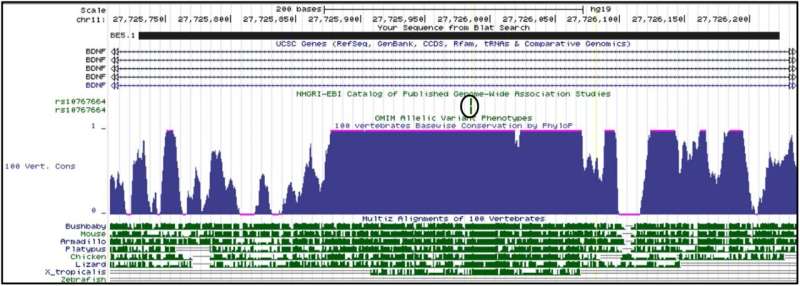This article has been reviewed according to Science X's editorial process and policies. Editors have highlighted the following attributes while ensuring the content's credibility:
fact-checked
peer-reviewed publication
trusted source
proofread
Scientists identify genetic anxiety 'switch'

Research from the University of Aberdeen has identified an area of DNA in the human genome that plays a role in controlling anxiety. In the study, published in Molecular Psychiatry, the team, led by Professor Alasdair Mackenzie, found a section of DNA that 'switches' on key genes in parts of the brain that affect anxiety levels in mice.
According to the Mental Health Foundation, in the wake of the pandemic, anxiety is on the increase and as many as 1 in 5 people experience anxiety most or all of the time. It is also reported that a third of patients on anti-anxiety medication do not experience sustained remission from anxiety.
The team behind this study from the University of Aberdeen hope that further research into this switch could help improve the lives of anxiety patients by identifying a new drug target.
Professor Mackenzie explains, "We already know that 95% of the genetic differences associated with disease are found outside of protein coding genes. This part of the genome, known as the 'non-coding genome' has not been well explored because we previously lacked the tools to do so.
"We also know that the non-coding genome contains information in the form of gene switches that tell genes where and when to be turned on. This is important as genes have to be switched on in the right cells and at the right times to ensure good health and when they are not turned on correctly can contribute to conditions like anxiety, depression and addiction. These areas of the non-coding genome are what we study in our lab."

The team's approach to understanding the role of the non-coding genome in anxiety, addiction and obesity, is unique. Professor Mackenzie's team recognized that many of these switches have remained virtually unchanged or conserved for hundreds of millions of years and can be found in both humans and mice.
"Our unique approach is to use CRISPR to delete these 'conserved' switches from mice and then study their role in mood, food intake and preference for alcohol."
Using CRISPR technology to delete specific areas in the genome, the team focused on an enhancer called BE5.1- that controls the well-known BDNF gene, thereby increasing levels of anxiety in females. This suggests that BE5.1 is a key part of the complex genome machinery in the brain that modulates anxiety.
Professor Mackenzie and the team in Aberdeen have previously found other highly conserved switches that reduced anxiety as well as appetite and alcohol intake when they were deleted from the mouse genome and have provided a template of how to explore the function of enhancers in complex disease-associated behaviors.
Dr. Andrew McEwan, the first author on the publication, says, "To understand the basis of complex human diseases, that includes mental illness and other conditions such as obesity, depression and addiction, it is as important to understand the mechanisms that ensure proper production of proteins in the right cells as it is to understand the proteins themselves.
"This will only be achieved if we better understand the non-coding genome in health and disease and the function and role of the thousands of enigmatic gene switches that lurk in its depths."
More information: Andrew R. McEwan et al, An ancient polymorphic regulatory region within the BDNF gene associated with obesity modulates anxiety-like behaviour in mice and humans, Molecular Psychiatry (2024). DOI: 10.1038/s41380-023-02359-7


















